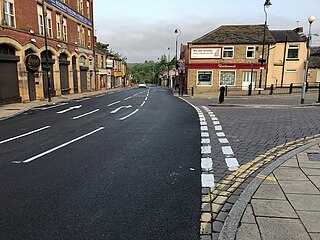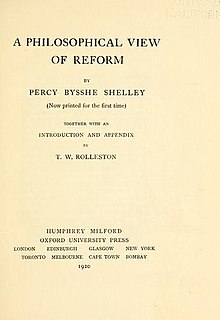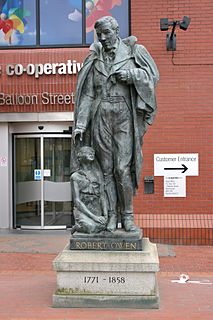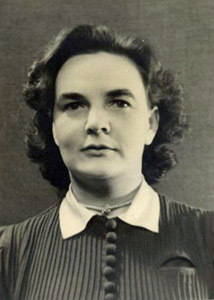
The Peterloo Massacre took place at St Peter's Field, Manchester, England, on 16 August 1819, when cavalry charged into a crowd of 60,000–80,000 who had gathered to demand the reform of parliamentary representation.

Richard Carlile was an important agitator for the establishment of universal suffrage and freedom of the press in the United Kingdom.

Lees is a village in the Metropolitan Borough of Oldham, Greater Manchester, England, which lies amongst the Pennines east of the River Medlock, 1.8 miles (2.9 km) east of Oldham, and 8.2 miles (13.2 km) east-northeast of Manchester. Historically on the Lancashire side of the ancient county boundary with the West Riding of Yorkshire, part of Lees is known locally as County End. Another part of Lees is called Hey and another part is called Crossbank. Hey and Crossbank were once separate village's until the Lees Urban District was set up and included those village's within the urban district.

Esther Roper was an English suffragist and social justice campaigner who fought for equal employment and voting rights for working-class women.

The Working Class Movement Library (WCML) is a collection of English language books, periodicals, pamphlets, archives and artefacts relating to the development of the political and cultural institutions of the working class which were created by the Industrial Revolution. It is situated in Salford, Greater Manchester, England.

Hugh Hornby Birley was a leading Manchester millowner and Tory who is reputed to have led the fatal charge of the Manchester and Salford Yeomanry at the Peterloo Massacre on 16 August 1819.

Robert Poole is a UK-based historian, currently Professor of History at the University of Central Lancashire, Preston. He gained his PhD from the University of Lancaster in 1986, where he was associated with Prof Harold Perkin's Centre for Social History, organising the 1996 conference of the Social History Society on 'Time and the Construction of the Past'. He has also held positions at the universities of Keele, Edge Hill and Cumbria. He has also been Leverhulme Senior Visiting Research Fellow at the University of Manchester (2000-1), an Associate of the Centre for the History of Science, Technology and Medicine, University of Manchester (2010-17), an associate of 'The Future in the Stars' research programme, Friedrich-Meinecke Institut, Freie Universität Berlin (2012-16), and visiting Senior Research Fellow to the History Group, University of Hertfordshire (2013-15).
Manchester and Salford Yeomanry cavalry was a short-lived yeomanry regiment formed in response to social unrest in northern England in 1817. The volunteer regiment became notorious for its involvement in the 1819 Peterloo Massacre, in which as many as 15 people were killed and 400–700 were injured. Often referred to simply as the Manchester Yeomanry, the regiment was disbanded in 1824.

A Philosophical View of Reform is a major prose work by Percy Bysshe Shelley written in 1819-20 and first published in 1920 by Oxford University Press. The political essay is Shelley's longest prose work.

Manchester in the United Kingdom is a city which was built by the Industrial Revolution, and has ultimately influenced political and social thinking in Britain and beyond. Historically, the city has been a hotbed for new, radical thinking, particularly during the Industrial Revolution which presented new social and political challenges for the United Kingdom. Urbanist Anna Minton describes Manchester as historically the "bellwether for social change in Britain".
The Little Circle was a Manchester-based group of Non-conformist Liberals who held a common agenda with regards to political and social reform. The first group met from 1815 onwards to reform political representation and gain social reform in the United Kingdom. The second group operated from 1830 onwards and was key in creating the popularist movement that resulted in the Reform Act 1832.
The Manchester Gazette was a conformist non-Tory newspaper based in Manchester, England.
The Manchester Observer was a short-lived non-conformist Liberal newspaper based in Manchester, England. Its radical agenda led to an invitation to Henry "Orator" Hunt to speak at a public meeting in Manchester led to the Peterloo massacre, and the shutdown of the newspaper.
Richard Potter (1778–1842) was a radical non-conformist Liberal Party MP for Wigan, and a founding member of the Little Circle which was key in gaining the Reform Act 1832.

Ruth Frow (1922–2008) was a peace activist and historian of the labour movement. She co-founded the Working Class Movement Library in Salford, a collection of material associated with labour and working class history.

Peterloo is a 2018 British historical drama, directed and written by Mike Leigh, based on the Peterloo Massacre of 1819. The film was selected to be screened in the main competition section of the 75th Venice International Film Festival. The film received its UK premiere on 17 October 2018, as part of the BFI London Film Festival, in Manchester. The screening marks the first time the festival has held a premiere outside London. Leigh said he was delighted that Peterloo would be premiered "where it happened."
The Female Political Union of the Working Classes was established in 1833 by Mary Fildes and Mrs Broadhurst.
The Blackburn Female Reform Society was established in early July 1819. They immediately sent a circular to other districts, inviting the wives and daughters of the workmen in the different branches of manufacturing to form themselves into similar societies. In response Manchester formed their own society of reformers on 20 July 1819.













